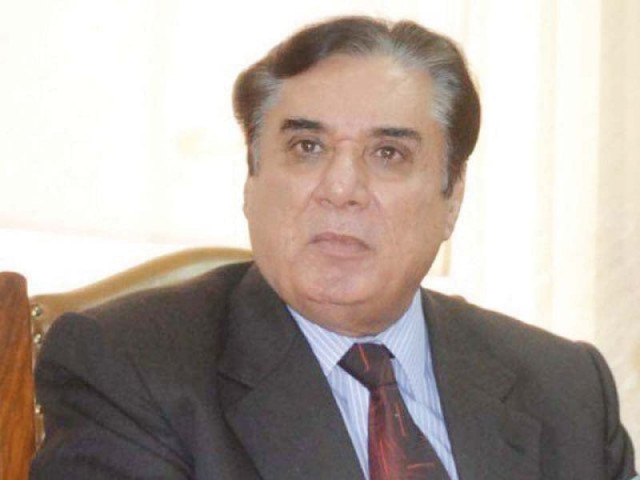SJC to decide about jurisdiction to proceed against NAB chief
'Meeting will be held on July 12 to consider jurisdictional issue regarding proceedings of misconduct NAB chairman'

The Supreme Judicial Council (SJC) is set to decide whether it has jurisdiction to proceed against the National Accountability Bureau (NAB) chairman over misconduct complaint.
Sources told The Express Tribune that a meeting of the SJC will be held on July 12 (Monday) to consider the jurisdictional issue regarding proceedings of misconduct against the NAB chief.
The SJC – the constitutional forum that can hold superior court judges accountable – comprises five members. The chief justice of Pakistan (CJP) is the SJC chairman while two senior-most apex court judges and two senior-most chief justices of the high courts are members of the council.
Currently, CJP Gulzar Ahmed, apex court judges Justice Mushir Alam, Justice Umar Ata Bandial and Sindh High Court (SHC) Chief Justice Ahmed Ali M Shaikh and Islamabad High Court (IHC) Chief Justice Athar Minallah are its members.
Last year, the council had fixed complaints for hearing registered against incumbent NAB Chairman Javed Iqbal.
Both were filed by lawyers – Barrister Zafarullah, Saeed Zafar and Mohsin Raza Ranjha – in 2019.
Read: NAB moves SC against IHC decision
Insiders also SAID that the SJC issued notice to Attorney General for Pakistan (AGP) Khalid Jawed Khan for legal assistance as to whether the council could proceed on the complaint of misconduct against the NAB chief or not.
Legal experts believe that there is an ambiguity in the law which deals with the removal of the NAB chairman.
According to Section 6 of NAB Ordinance, the chairman “shall not be removed except on the grounds of removal of a Supreme Court judge”.
Likewise, legal experts argue that in view of the above provision, the chairman can be removed over the same reasons as a judge of the apex court as mentioned in the Supreme Court Judges’ Misconduct 2009.
However, there is no separate mechanism provided for the removal of NAB chairman in the law. Even it is not mentioned that the SJC could be a forum regarding his removal.
The law may provide clear guidelines for the appointment of NAB chief, but there is no clear mechanism for the removal of the anti-graft watchdog’s chief, according to legal experts.
In the Asfand Yar Wali case 2001/02, the top court had directed the federal government to add conditions regarding the removal of the NAB boss where the government ‘left out’ the procedure for the graft watchdog’s chief.
Read more: Ghani says NAB chief under pressure
Interestingly, the Constitution is also silent about the removal of NAB chairman. Article 209 talks about the removal of judges and auditor general of Pakistan through the SJC.
Likewise, another constitutional article allows for the removal of Election Commission of Pakistan (ECP) members by the SJC. However, there is nothing mentioned about the removal of the NAB chairman through the council.
In the Panamagate case judgement, ex-chief justice Asif Saeed Khosa had also noted that the direction for initiating proceedings against the NAB chief under Article 209 of the Constitution may involve some jurisdictional issues.
Even the council had raised the same jurisdictional issue, when it took up a complaint of misconduct against then chairman NAB Qamar Zaman. That complaint was filed by incumbent PTI Information Minister Fawad Chaudhry in view of Supreme Court observations in the Panamagate judgement.
A section of the lawyers believes if the law is silent, the appointing authority (President of Pakistan) may remove the person under General Clauses Act, 1897.
A senior official in the law ministry said that if the SJC held that it has no jurisdiction to proceed on the complaint of misconduct against the graft watchdog then the federal government may carry out new legislation to end ambiguity.
The tenure of the incumbent NAB chief is ending in the month of October this year. However, there are reports that the government is considering different options to give him an extension through legislation.
Political analysts say that opposition parties will strongly resist any government move to extend incumbent chairman NAB’s tenure.
During incumbent chairman NAB tenure, many politicians mainly belonging to opposition parties were sent behind bars during the investigation stage.



















COMMENTS
Comments are moderated and generally will be posted if they are on-topic and not abusive.
For more information, please see our Comments FAQ